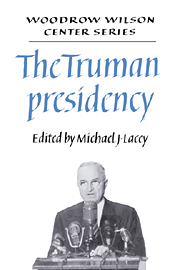Introduction and summary: The Truman era in retrospect
Published online by Cambridge University Press: 06 October 2009
Summary
The essays in this volume were presented as papers in September 1984 at a scholarly symposium at the Woodrow Wilson Center, one of many events that occurred in that year to commemorate the centennial of Harry Truman's birth. As a scholarly gathering, its aim was not to celebrate those aspects of President Truman's outlook and temperament that had earned for him in the decades after he left office such a respected place in political folklore and popular consciousness, but instead to reflect critically on the major developments of the Truman era in light of recent scholarship.
Important historical questions are seldom finally settled, but rather are constantly reinterpreted. Their status changes not only with the discovery of new sources, but with the changing perspective of the historians themselves, as influenced by the currents of their own contemporary experience. In the academic community, to take the case in point, the meaning of the Truman era—its achievements and failures and its placement in the developing political tradition—is a more complex, controversial, and ambiguous problem than in the popular mind. For some, Truman represented high achievement, the protection and extension of New Deal impulses, the orchestration of the great success story in American diplomacy in the reconstruction of Europe and restructuring of a viable world economy, and the establishment of a system for the defense of the free world.
From others, in what came to be called the revisionist school of the 1960s and 1970s, a new set of themes appeared.
- Type
- Chapter
- Information
- The Truman Presidency , pp. 1 - 18Publisher: Cambridge University PressPrint publication year: 1989



